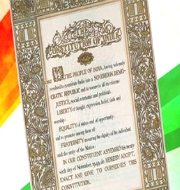Kesavananda Bharati Case
India’s Constitution, adopted in 1950, lays out the framework for governing the world’s largest democracy. The Constitution has been amended many times since its inception, with more than 60 amendments passed since 1973. However, the “basic structure” doctrine, introduced in the landmark case of Kesavananda Bharati v State of Kerala has become a vital mechanism for ensuring that Parliament’s power to amend the Constitution is not unlimited.
The Kesavananda Bharati Ruling
In 1973, the Supreme Court of India ruled on the case of Kesavananda Bharati v State of Kerala, in which the petitioner challenged the constitutionality of land reforms legislation passed by the Kerala State Legislature. The Court upheld the legislation but also introduced the “basic structure” doctrine. The doctrine states that Parliament’s power to amend the Constitution is limited and cannot be used to destroy or alter its “basic structure”. This includes the principles of democracy, secularism, federalism, and the rule of law, among others.
Testing Constitutional Amendments Against the Basic Structure Doctrine
Since 1973, at least 16 cases have tested constitutional amendments against the basic structure doctrine. In only one instance has the Supreme Court struck down an entire constitutional amendment: the Constitution (Ninety-ninth Amendment) Act, 2014. The amendment provided for the establishment of a National Judicial Appointments Commission, which would have replaced the collegium system of appointing judges to the higher judiciary. However, the Supreme Court struck it down as it threatened “judicial independence”, which it ruled was a basic feature of the Constitution.
Partially Striking Down Constitutional Amendments
The Supreme Court has partially struck down six constitutional amendments since 1973. The Constitution (Fifty-second Amendment) Act dealt with the Tenth Schedule, also known as the “anti-defection law”. The Constitution (Thirty-ninth Amendment) Act, 1975, barred the Supreme Court from hearing challenges to the election of the President, Prime Minister, Vice-President, and Speaker of Lok Sabha. The Constitution (Ninety-seventh Amendment) Act, 2011, introduced changes to the legal regime for cooperative societies. In 2021, the Supreme Court struck down a portion of the Constitution (Ninety-seventh Amendment) Act on procedural grounds, not basic structure grounds.
Month: Current Affairs – April, 2023
Category: Legal & Constitution Current Affairs


